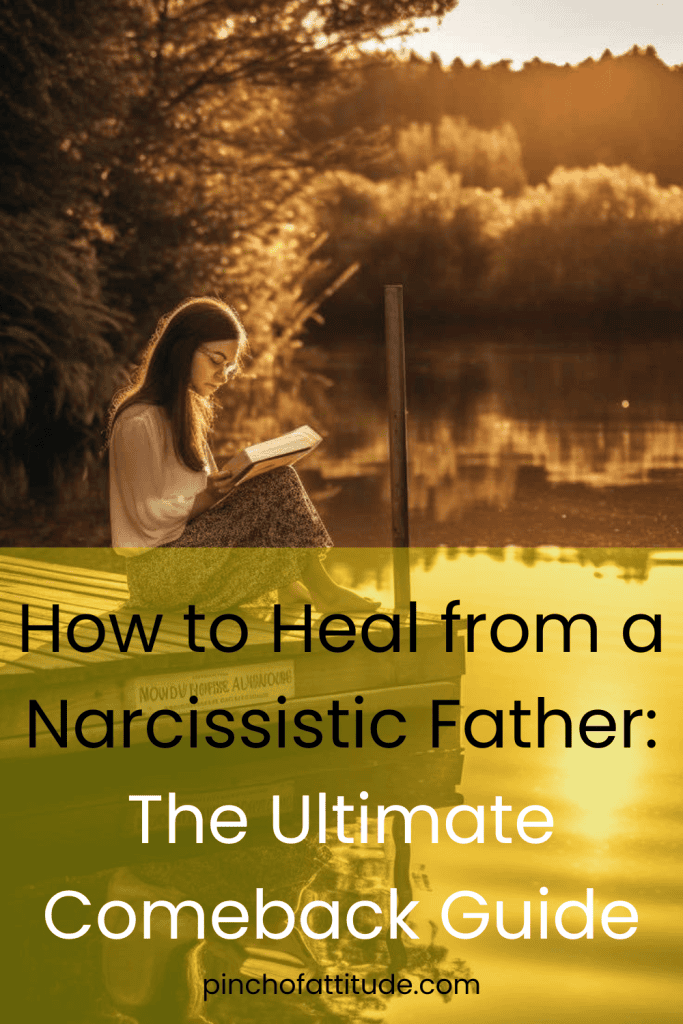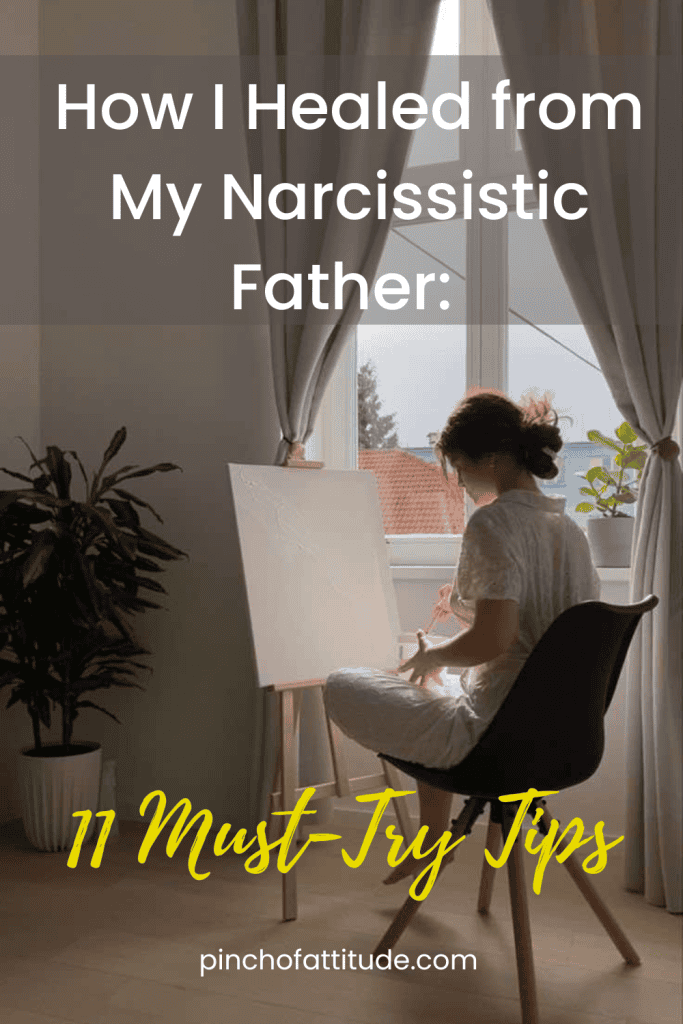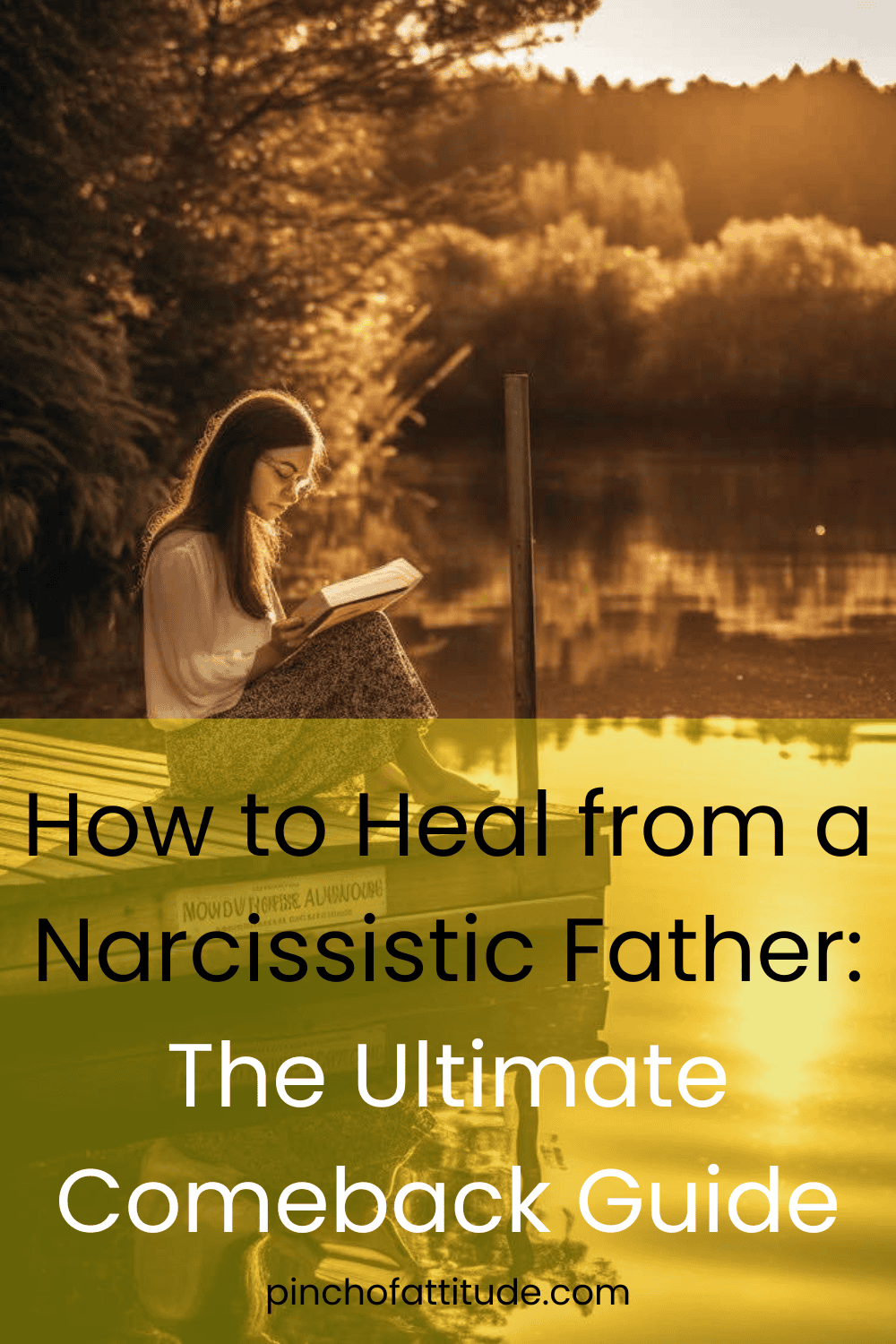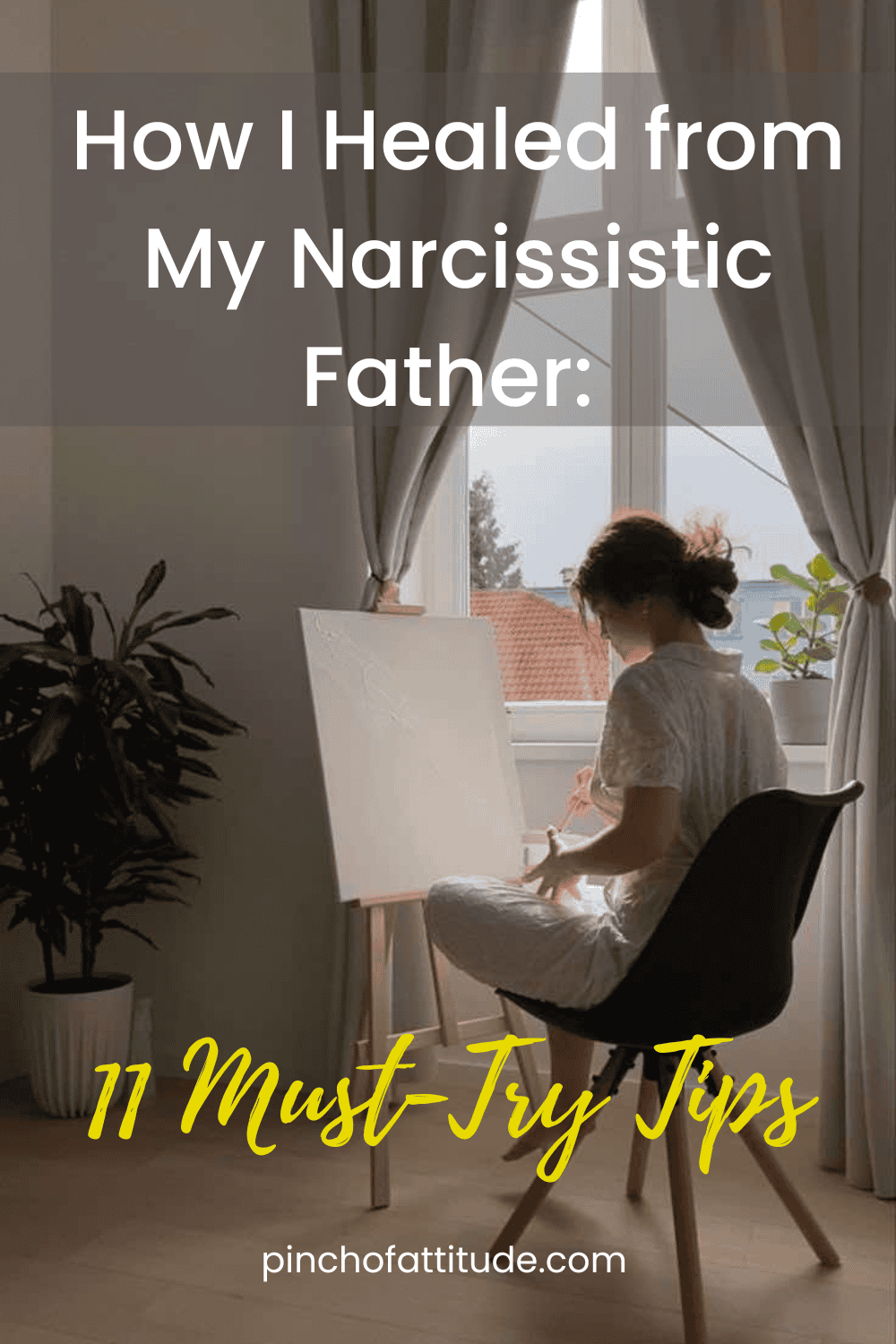Ever wonder how to heal from a narcissistic father?
As an adult child of a narcissistic mother, and with cousins who dodged a bullet (or several) with their narcissistic dad, I get the struggle.
The walking on eggshells, the constant gaslighting, the feeling of never quite measuring up – it’s enough to make you wonder if “normal” even exists.
But guess what? You’re not stuck in that emotional funhouse forever. Healing is possible.
Below, I’ll share 11 steps toward healing that show your past pain doesn’t automatically define your present (or future!)
- Healing from a narcissistic father doesn’t mean you’re trying to fix the past. It’s about rewriting your future.
- Don’t let gaslighting or manipulation invalidate your emotions. They are real and deserve to be heard, both by you and others.
- Forgive yourself for past struggles and embrace your flaws. Kindness towards yourself fuels your healing journey.
Table of Contents
11 Tips on How to Heal From a Narcissistic Father

You’re probably asking, “How do I heal from a narcissistic father?” I was, too.
Growing up with a narcissist for a mom, the spotlight was never on me.
I wasn’t the favorite child or the golden child, always showered with praise and affection. Instead, I was the one who always got the blame, the scapegoat.
Yet, even in the storm of accusations and gaslighting, I clung to a spark of hope.
Below, I’ll share my journey, the scars, and the triumphs, alongside the stories of my cousins who walked similar paths.
And in our shared experiences, I hope you can also begin to untangle the knots of the past and start moving forward.
1. Consider Therapy if You Feel You Can’t Do It on Your Own
One of the best things I did to recover from the effects of my mom’s narcissism was to find a therapist who understood me.
Between the gaslighting and the emotional whiplash, it’s easy to feel like you’re drowning in the aftershock of a narcissist’s dysfunctional parenting.
But you don’t have to do this alone.
A mental health professional can help you untangle the wires of your feelings, understand the “why” behind it all, and most importantly, discover who you are beyond your dad’s shadow.
Tip
If you’re feeling lost, don’t hesitate to reach out for professional help. You deserve to thrive, not just survive.
2. Set Firm Boundaries With Your Narcissistic Father
An important part of your healing work revolves around developing and maintaining boundaries.
It isn’t easy, but it’s necessary. Think of it like saying “no” to emotional manipulation and protecting your hard-earned peace.
Take my cousins, for example. Abandoned as kids, they built amazing lives on their own, only to have Daddy Dearest waltz back in like nothing happened.
Good thing, they were raised by a rockstar mom and knew their worth. They slammed the door shut, loud and clear.
A narcissistic father often tries to sabotage your attempt to heal. So, set boundaries – limited contact, no emotional baggage, zero tolerance for manipulation.
3. Be Kind to Yourself, You’re in a Tough Place
Growing up, I used to beat myself up for every perceived slight from my narcissistic mother. I was convinced there was something wrong with me for triggering her outburst.
It took me quite some time to realize that the thing that was twisted wasn’t me, it was her narcissistic behavior. And that’s when I started to be kinder to myself.
Think of your younger self – the one who walked on eggshells doubted their every move, and struggled with a bruised self-esteem.
Would you yell at a scared kid lost in the woods? No, right? So, be gentle with yourself. You’ve been through enough. Now, it’s time to heal.
4. Allow Yourself to Accept That the Abuse Happened
Do you sometimes hear that nagging little voice whispering, “He wasn’t that bad, was he?” Yeah, I’ve been there and got the self-doubt T-shirt to prove it.
I remember all those times I questioned myself, convinced I was the “crazy” one.
My therapist helped me realize that that’s the twisted perception of reality a narcissistic parent imposes on a child to try and minimize the abuse.
The thing is, denying your dad’s abusive behavior only keeps you trapped in his mind games.
To heal from narcissistic abuse, you first have to accept the hurt, the anger, and the confusion it caused. It’s not your fault, but it happened.
5. Remember That Your Feelings Are Valid
A narcissist may project their insecurities onto you, like a funhouse mirror twisting your reflection. But underneath those, your true feelings exist, raw and real.
The anger at being blamed for everything, the sadness at their lack of genuine connection, and the confusion about who you really are? It’s all valid.
Healing from a narcissistic parent is about accepting all these emotions, not shoving them down like dirty laundry.
It’s about recognizing that your feelings are your compass, even if they seem like a jumbled mess right now.
Tip
Your feelings are valid. Listen to them, honor them, and let them guide you on your healing journey.
6. Build Supportive Relationships So You Can Reach Out to Them
Children of narcissistic parents often develop this “lone wolf” complex, thinking, “Who would understand anyway?”
But you were never meant to heal in isolation. We all need a pack, a tribe of kind souls who can validate our experiences and say, “That’s okay, you’re not crazy.”
It took me some time and a whole lot of effort to build these supportive relationships.
But you can start by reaching out to friends who seem open-minded and empathetic. Share your story, piece by piece.
I also found peace in joining online communities for survivors of narcissistic abuse.
7. Explore Healing Activities That Keep Your Mind in the Right Place
It’s way too common to see others deal with the effects of emotional abuse through addictive and self-destructive ways.
But with the right support and guidance, you can find healthy ways to focus your healing work on the positive.
In my experience, I learned that meditation, journaling, and sports are my drugs.
Meditation became my quiet space where I could untangle the knots of anger and confusion.
In journaling, I was able to pour my soul onto paper, one messy sentence at a time. And sports? It was my battle cry, a way to channel the hurt into power.
These activities aren’t distractions. They are necessary to your healing process.
8. Educate Yourself About Narcissism and Narcissistic Parenting
Narcissistic personality disorder isn’t just a fancy term for being a jerk. It’s a real thing, a pattern of behavior that can mess with your head and your heart.
I can’t count how many times I’ve tried to figure out why my narcissistic mom is the way she is. Don’t get me wrong, though. It’s not to make excuses about her behavior.
In my mind, if I understood her more, I could soften how narcissistic parenting can impact my life.
What you have to remember is that narcissistic parents see the child as an extension of themselves, not separate people.
So, their need for control and their lack of empathy all spill over onto their children.
When I finally understood this, I started to believe what my friends kept telling me. The abuse I endured wasn’t my fault.
Tip
Knowledge is power. The more you understand about narcissism, the more you can detach from your dad’s distorted reality.
9. Work on Forgiveness for Yourself to Move Forward

Yeah, I know, after surviving neglect and emotional abuse from a narcissist in your life, forgiveness can feel like swallowing sunshine and burping rainbows.
But the truth is, you’re not letting him off the hook. You’re setting yourself free.
Think of it like this: holding onto anger and resentment is like carrying a backpack full of bricks. Every step is heavier, every breath tougher.
Forgiving yourself means deciding you deserve lightness, you deserve to put down that backpack and walk with peace.
This doesn’t mean you have to love or even like your dad. That’s totally personal.
But forgiving yourself for everything you felt, everything you did (or didn’t do) in response to his toxicity? That’s pure magic.
It’s telling yourself, “I did the best I could with what I had,” and letting go of the guilt and the self-blame.
10. Reclaim Your Identity of Who You Want to Be
I’ve met many adult children of narcissists, and what I noticed is that we all struggle with building a stable sense of self.
It’s like our identities were built on shifting sand, constantly adjusting to fit their ever-changing moods.
Remember that little kid you used to be, the one with eyes full of dreams and a heart bursting with potential? The one your dad’s shadow never touched?
That’s who you are at your core.
Now, you just have to peel back the layers of doubt and manipulation and rediscover the passions, values, and quirks that make you uniquely you.
Tip
Try new things, explore hidden talents, and reconnect with your long-lost interests. Each discovery will lead you to who you were always meant to be.
11. Create a Positive and Healthy Environment to Uplift Your Soul
I still find it hard to believe that a parent who should be loving could create such chaos, especially now that I’m a mother myself.
But I realized that I don’t have to build my life on the same shaky foundations. I can craft a new haven, a space that sings to my soul and nourishes my spirit.
So, instead of wasting my energy trying to make sense of the past, I choose to focus on the future.
You are more than your narcissistic parent. You’ve got friends who celebrate your quirks, mentors who believe in your dreams, and activities that make your heart sing.
Creating a positive and healthy environment for yourself is like saying, “I deserve something better.”
It’s about creating a space where you can breathe, laugh, and continue to heal.
Why It’s Important to Heal From Your Narcissist Father?
Healing from a narcissistic father is important because it allows you to dismantle the warped foundation of your childhood so you don’t repeat the hurtful patterns in your adult life.
Why? Those raised in a narcissistic family almost always have distorted perceptions of love, trust, and healthy relationships.
A child of a narcissistic parent might dim their light and prioritize the needs of others over their own.
Without healing, you risk repeating the cycle, either by developing narcissistic tendencies yourself or drawing in partners who echo the patterns of your narcissistic parent.
However, the impact of healing and recovery from narcissistic abuse goes far beyond avoiding harmful relationships.
It’s also about reclaiming who you are and learning to love and accept the real you, flaws and all.
Because in the end, healing isn’t just about escaping the darkness. It’s about stepping into the light (your light) and finally letting it shine.
Related Posts:
- Cutting Off Your Narcissistic Father: When & How You Should Take Action
- 11 Unique Strategies on How to Deal With Narcissist Parents: Healing Is My Focus
- Healing From Narcissistic Family Abuse: My Story, Your Hope
- 13 Steps to Healing From a Narcissistic Parent: How I Moved Forward When Moving Away
- 30 Days Self-Love Challenge to Recover and Heal From Narcissistic Abuse
Frequently Asked Questions
What happens when you grow up with a narcissistic father?
If you were raised by a narcissist, you may develop emotional trauma and self-esteem issues. You may also find it hard to form healthy relationships in adulthood.
How do you recover from your childhood narcissistic father’s abuse?
In order to heal from a narcissist’s abuse, seek therapy, set boundaries, and prioritize self-care. Make sure you also surround yourself with supportive friends.
Can healing from a narcissistic father improve your relationships and the ability to trust others?
Yes, healing from the childhood trauma a narcissistic father caused can help improve your relationships and your ability to trust.
What role does self-compassion play in the healing journey from a narcissistic father?
Self-compassion helps you heal by replacing self-blame with understanding. It builds resilience so you can face triggers with kindness, not criticism.
How can you break the cycle of toxic behavior if you become a parent after healing from a narcissistic father?
To break the cycle and become a loving parent, you have to practice self-awareness. Seek help from a therapist specializing in narcissistic abuse recovery.




